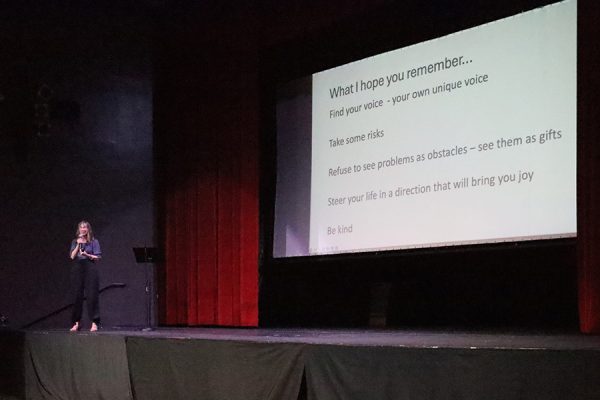Dr. Alan Grant and the economics of “Seinfeld”
“Seinfeld” represents a staple in the landscape of late twentieth-century American television. Starring Jerry Seinfeld, the sitcom ran for nine seasons and aimed to entertain people through everyday life scenarios. Throughout the nineties, audiences turned to “the show about nothing” for comedy that stemmed from relatability and mundanity.
However, for Dr. Alan Grant, professor of economics, the show offered an additional perspective: lessons in economics.
Thus arose “The Economics of Seinfeld.” The website is simple, displaying a header in the show’s font and a list of episodes with corresponding economic principles. It explores the topics, using clips from the show as easily understandable examples of economics.
The idea started at Eastern Illinois University amongst a group of coworkers. The concept at hand was the intersection of pop culture and economics, and the use of the former as a teaching tool in order to build excitement and interest in the subject matter.
“We thought there were lots of lessons contained in pop culture that sort of meshed with what we were doing in our textbooks in a much more dry fashion,” Grant said.
Going off this, the decision was made to go through a show from start to finish and employ it as an illustration of economic principles. These discussions occurred around the same time Seinfeld ended its run on air. It was at this point that “The Economics of Seinfeld” was born. Armed with DVDs of the sitcom, Grant set to work.
“We went through an episode every day or two and then discussed various scenes and whether it was a good illustration or a bad illustration. Then [we] ultimately decided on what to clip with some fairly primitive technology at the time. It’s time-consuming,” Grant said. “My wife at the time mocked me mercilessly every time I would go turn on Seinfeld. She’d go, ‘what are you doing, some more “research”?’”
The project took a year. The process involved watching an episode followed by a discussion of potential applications with a colleague. Once relevant clips were chosen, they were uploaded to the project’s website so teachers could use the clips to demonstrate a point without hunting through thirty-minute episodes.
The impact of the project was unexpected, and “The Economics of Seinfeld” was met with surprising success.
“At the beginning, of course, the series was a lot fresher. But we had our website and we were getting half a million hits a day. Something like that says people were very interested in watching these things,” Grant stated. “We thought it was only economics teachers that were going to watch it and economics teachers are pretty boring people, to be honest with you. But it seemed to have an audience that went beyond econ teachers.”
The website also garnered coverage and mention from a variety of news organizations, including the New York Times, Businessweek, Wall Street Journal, the Economist and National Public Radio’s (NPR) Planet Money podcast. In 2014, Danielle Kurtzleben wrote an article on Vox recommending the reader “click through and while away the rest of your afternoon watching your favorite beloved Seinfeld clips. It’s not wasting time; it’s educational.”
What makes Seinfeld the optimal show for such an examination? The key, Grant explained, is the show’s use of decisions.
“Economics is all about how people make the choices that they make. And there is nothing going on in Seinfeld, except people making decisions all of the time,” Grant said. “The decisions they’re making and the decisions that you and I make every day are all economic decisions. So there are some nice illustrations in Seinfeld that sort of resonate with people because their lives are actually a lot like those people’s lives.”
For example, Grant’s favorite episode of the show revolves around the “Soup Nazi,” a renowned vendor who is known to humiliate customers. But it still offers lessons about economics.
“There are lots of great concepts that are illustrated in that about the market,” Grant said. “When you have a monopoly and you’re the only person who does it this well you can get away with a lot of crap that for sure people wouldn’t ordinarily put up with if they had other choices.”
Discussion of the project in the press continues and Grant said that he did an interview for a podcast with Bloomberg recently. The website was even adapted into a book, which Grant keeps a copy of in his office.
While “The Economics of Seinfeld” has found its conclusion, further projects lie ahead for Grant in the realm of pop culture and teaching. Along with Linda Ghent, cofounder of the website, he will be spending his spring break discussing a future project that will explain game theory via the popular show “Game of Thrones”.
“We’re calling it Game Theory of Thrones: outwit your opponent, get your way every time,” Grant said. “So we’re very excited about that.”
Grant sees “The Economics of Seinfeld” as a demonstration of a successful means by which economics can be taught. Shows from “Seinfeld” to “Game of Thrones” can provide all sorts of educational opportunities if seen through the right lens.
“If you want students to learn about economics, maybe it’s worthwhile to meet them on their home ground,” Grant said. “Because economics is about decisions and nobody goes a day without making a decision about something. It’s everywhere, including in the places that you love the most.”












